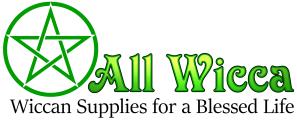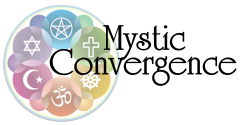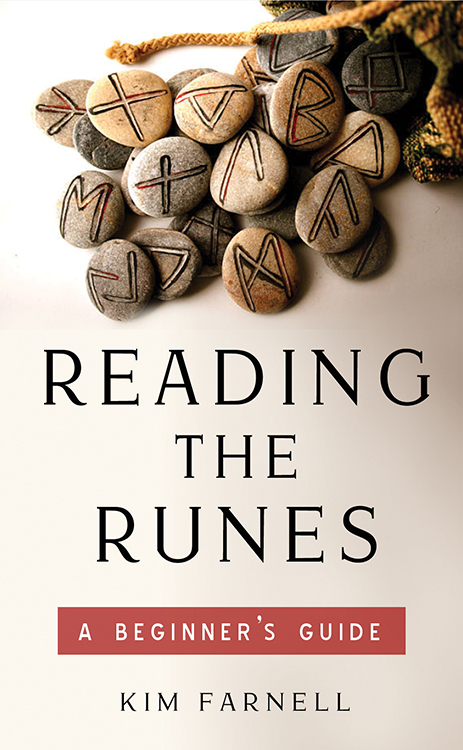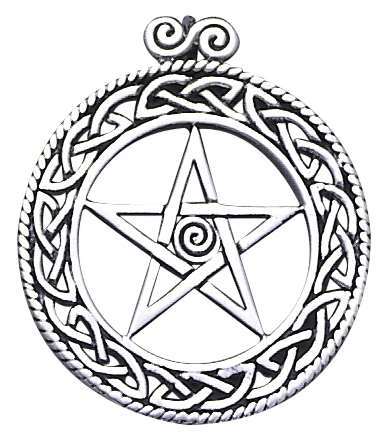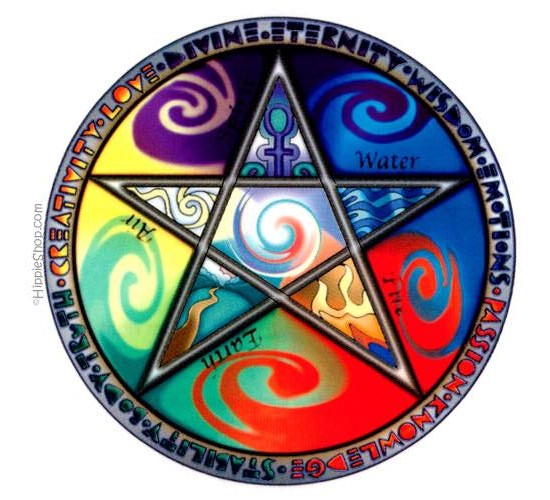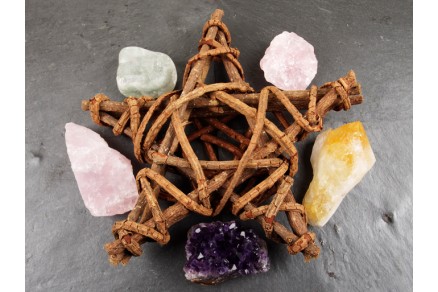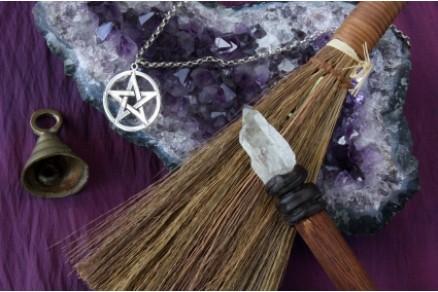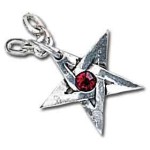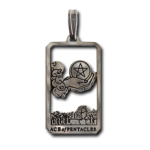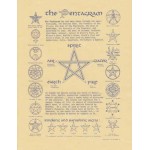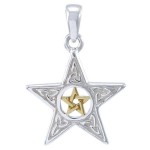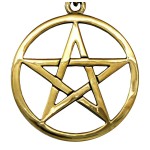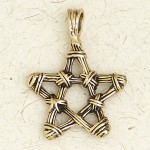The Magic of the Pentacle - What is a Pentacle?
- 3568
- 0
The pentacle and the pentagram are both fascinating symbols that have captivated the human imagination for centuries. In this article, we embark on a journey to unravel the profound meanings and differences between these two mystical symbols. Join us as we explore their origins, symbolism, and their significance in various spiritual and magical practices.
Differences Between a Pentacle and Pentagram
The pentacle and the pentagram have ancient origins, rooted in different cultures and civilizations.
The pentagram, a renowned emblem consisting of a five-pointed star, can trace its roots back thousands of years to ancient Mesopotamia, where it was intertwined with the worship of the Sumerian goddess Inanna. This mesmerizing symbol found its way into the spiritual and mystical practices of many cultures, including ancient Greece and Egypt. It held diverse interpretations, embodying concepts such as the five elements, the five senses, and the five directions (north, south, east, west, and the center).
On the other hand, the pentacle emerged as a variation of the pentagram, characterized by the inclusion of a circle that encloses the five-pointed star. While the pentagram boasts an extensive historical lineage, the pentacle is often considered a more recent adaptation of the symbol. The circle surrounding the pentagram adds an extra layer of significance, as it symbolizes unity, eternity, protection, and the cyclical nature of life. It serves as a visual representation of the interconnectedness of all things and the continuous flow of energy within the universe.
Symbolic Meanings & Magical Uses:
Both the pentacle and the pentagram hold significant meaning within various magical and spiritual traditions. They have become integral symbols in practices such as Wicca, Paganism, ceremonial magic, and occultism. Their presence in rituals, talismans, and jewelry symbolizes protection, invocation of spiritual forces, connection with higher realms, and the pursuit of personal growth and enlightenment.
Delving deeper into the realm of symbolism, the pentacle embodies the concept of wholeness and completeness. The circle enveloping the pentagram signifies the eternal and infinite nature of existence, offering a sense of harmony and balance. It represents the unification of the five elements—earth, air, fire, water, and spirit—and their interconnected influence on the world. This unity extends beyond the material realm and encompasses the spiritual, the metaphysical, and the cosmic.
Conversely, the pentagram, in its unenclosed form, maintains its intrinsic symbolism and elemental associations. Each of the five points represents one of the elements, with the upward-facing point typically representing spirit or the divine. The pentagram, without the encompassing circle, exudes a distinct energy, emphasizing the dynamic nature of the individual elements and their interaction. It embodies the power of transformation, balance, and spiritual evolution, encouraging seekers of wisdom to explore the depths of their existence.
Both the pentagram and the pentacle find application in magical and ritualistic practices. The pentagram is often used as a symbol of protection and invocation, serving as a focal point for rituals and ceremonies. It is associated with harnessing elemental energies, directing intentions, and connecting with the divine. The pentacle, with its circular form, acts as a tool for the consecration and amplification of magical energy. It is commonly used in Wiccan and Pagan traditions as an altar tool and a symbol of sacred space.
Interpretations and Variations:
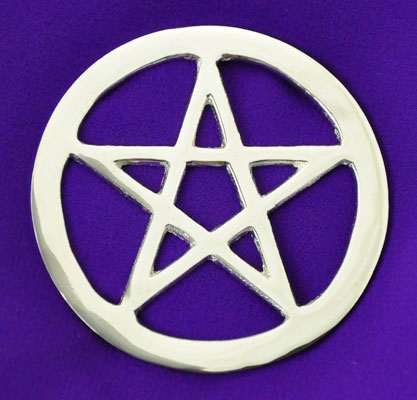 The interpretations of the pentacle and pentagram can differ among various belief systems and personal perspectives. In Wicca, the pentacle is associated with the Goddess and the five points represent the elements and the divine feminine energies. It is viewed as a symbol of protection, fertility, and spiritual wholeness. The pentagram, in ceremonial magic, is often linked to the five points of the Tarot suit of coins or pentacles, representing material abundance and manifestation. Both symbols can represent the 4 elements: Earth, Air, Fire and Water with the fifth point indicating Spirit or Divinity. However, interpretations can vary widely, and individuals may find personal meaning and significance in these symbols beyond traditional associations.
The interpretations of the pentacle and pentagram can differ among various belief systems and personal perspectives. In Wicca, the pentacle is associated with the Goddess and the five points represent the elements and the divine feminine energies. It is viewed as a symbol of protection, fertility, and spiritual wholeness. The pentagram, in ceremonial magic, is often linked to the five points of the Tarot suit of coins or pentacles, representing material abundance and manifestation. Both symbols can represent the 4 elements: Earth, Air, Fire and Water with the fifth point indicating Spirit or Divinity. However, interpretations can vary widely, and individuals may find personal meaning and significance in these symbols beyond traditional associations.
Celtic knotwork can be incorporated in the Pentacle to further represent the interconnectedness of nature and the elements.
The inverted pentacle, with the point down instead of up, has sparked a lot of debate as to its meaning. Adopted by the practice of Satanism, it has come to be seen as a representation of the Devil or Satan, though Wiccans and most Pagans do not believe in such an entity. To them, it is the idea of Spirit, represented by the top point when facing upright, being brought down to Earth or the power of manifestation. It also represents "drawing down" the power from the heavens to Earth as a symbol of manifestation. Satanists view the inverted pentacle as a symbol of exercising their own will, power, and independence to control nature.
The pentacle and pentagram are potent symbols that have woven their way through the tapestry of human history, spirituality, and magic. Whether it's the five-pointed star or the enclosed pentagram, these symbols resonate with seekers of esoteric wisdom, representing harmony, balance, and the interconnectedness of the universe. As we delve into the meanings and differences between the pentacle and pentagram, may we embrace their mystique, draw inspiration from their ancient origins, and find personal connection and empowerment within their profound symbolism.
Related Posts
5 Misconceptions about Traditional Wicca
- 1296
- 1
With the rise of eclectic, do-it-yourself Wicca, traditional Wicca quickly took a backseat. But our numbers are rising.
What is a Magic Amulet or Talisman? How do I use it?
- 2869
- 1
When you are considering something to empower (or enchant if you want to use a more magical sounding term), consider what you want it to do...and look at the design to see what it says to you. Then le..
How to Empower your Amulet or Talisman
- 2830
- 2
A few posts ago, I talked about how an amulet or talisman was just a hunk of metal - unless you empower it. This time, I'll expand a little more on it and tell you how to empower it for your intent.
